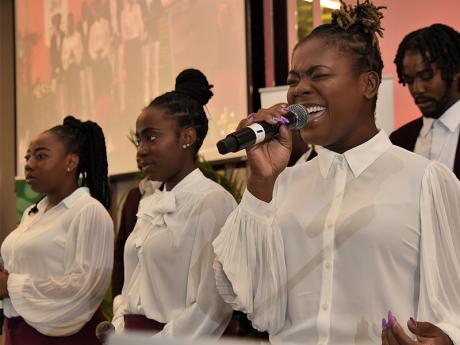Much progress has been made towards the goal of ending HIV/AIDS by 2030, but the virus remains an epidemic made worse by the many gaps, such as social barriers created as a result of stigma and discrimination against persons living with and affected by HIV.
That remains one of the main deterrents to achieving that much-desired goal, according to Regional Coordinator for PEPFAR (US President's Emergency Plan for AIDS Relief), Simone Jackson.
She was speaking at Wednesday's World Health Day Breakfast Forum held at the AC Marriott hotel in St Andrew under the theme 'Equalise'.
“We cannot achieve our goal to end AIDS if we deny people's human rights and their sexual and reproductive rights or allow discrimination against people living with HIV or those who are vulnerable to acquiring HIV,” she declared in her address to the function.
“I urge us all, to put ourselves to the test, to work together to... achieve the end of AIDS,” Jackson challenged her audience.
However, for Judy-Ann Nugent, Operations Manager at the Jamaican Network of Seropositives, which hosted the event, not enough effort is being made in this regard locally.
“This morning, on behalf of all persons living with HIV, I call for our nation to equalise health care, equalise inclusion, equalise the voices of people living with HIV. There is no HIV funding, no HIV response and no HIV advocacy without people living with HIV.
“People living with HIV must not just be seen and heard, but should be a critical part of the HIV response. It is time for tokenism to end. Equal treatment means ensuring equitable, affordable and accessible health care. Let us all continue to educate people about HIV and AIDS,” she appealed.
Meanwhile, according to Chair of the Jamaica Civil Society Forum on HIV and AIDS, Jumoke Patrick, persons in Jamaica who are living with HIV, as well as those affected by it, are still struggling with injustice and gross inequality. This is especially egregious in light of the theme of World Aids Day 'Equalise', he pointed out.
“As a country we are far from providing quality HIV service. We are far from ensuring that HIV services are suitable for those living with the virus and those who are at risk. We are far from making HIV services friendly for those who want to access them,” he asserted.
He questioned: “Yes, we can pat ourselves on the back and say 'good job team' but how is that a good job when people living with HIV are still dying, gay men are still suffering , trans persons are being mocked and in many cases abused violently? Are we turning a blind eye? Are we saying a nuh my business that? Or are we saying that a too much work?"
Patrick, who is also Executive Director of the Jamaican Network of Seropositives, lamented the toll the task of advocacy has taken on him.
“We cannot truly rest when we are still having laws and policies and practices that hurt, marginalise and exclude citizens of this country because of their identity and status.
“We know what to do but sadly, we are not doing it," he said.

